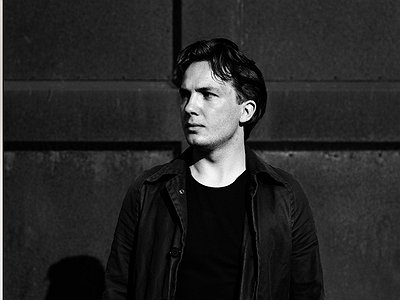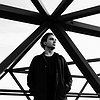Part 1
Name: Rasmus Juncker
Nationality: Danish
Occupation: Sound composer / drummer / music engineer / DJ
Current Release: Ophold on Kingdoms
Recommendations: I recently discovered the great American photographer Imogen Cunningham and I’m so amazed by all her photos. She worked with both botanic, industrial landscapes and human photography. Three common themes that resonates very well with my own interests. They all have this cool mysticism and simple black and white beauty / M.C. Escher always entertains my perception and curiosity. It's so musical both in an illusory and transcendental way.
Visit Rasmus Juncker online via his Facebook page www.facebook.com/rasmusjunckermusik
When did you start writing/producing music - and what or who were your early passions and influences? What is it about music and/or sound that drew you to it?
I have been playing the drums ever since my cousin introduced me at the age of 7. My classmates and I later started to play in a rock band and recording music on our own. We got very curious about synthesizers, software and machines and I started to DJ at local parties with my good friend and producer Kasper Marott. We made our own funny DJ mixtapes on DVDs and also started producing music together when we were around 13. I remember being so fascinated by the entertaining possibilities in the software that we had available and it was the ultimate source of great fun and constant inspiration. Kasper’s uncles had this awesome live house-band called M.A.S.K. We became so inspired and swore that we would create our own live sets together. We continued to make music and after the radio hosts Kjeld Tolstrup and Le Gammeltoft supported our music on national radio, we became motivated to continue producing music and soon became a part of the Copenhagen electronic scene.
I got gradually more into jazz and improvised music and did focused studies for several years before returning to producing and composing music with a new approach. Probably, my earliest influence are my parents’ jobs as gardeners. When I was young I didn’t really think much about it, but being able to join them and learn about nature from them, is a true gift. Even though it seems very different from music, I actually think that gardening, art and music production have much in common.
For most artists, originality is first preceded by a phase of learning and, often, emulating others. How would you describe your own development as an artist and the transition towards your own voice? What is the relationship between copying, learning and your own creativity?
It all started out as fun, and every time I felt inspired by a specific artist, I made new music trying to figure out how to emulate certain sounds. It was really essential to develop these skills by learning from my inspirations and to be curious, and it still is.
Now the process can be a bit more complex and the inspiration can come from a painting, literature or something other than music. I can be very inspired by certain aesthetic concepts and I have been working on how to use that in my own musical process. On ‘Ophold’ I tried to compose music without knowing anything about the final result. I composed and arranged with recorded improvisations made by different musicians, one after another, but the improvisations were somehow guided by me towards a certain aesthetic that I had in mind. This aesthetic vision is something I’ve built up through many years and I see this as my personal voice. It’s where all influences and experiences meet in a musical narrative.
What were your main compositional- and production-challenges in the beginning and how have they changed over time?
When I started out doing music I experimented freely and didn’t see many challenges, it was all about the fun of learning it. After years of practice and studies my main challenges became the fear of not being an original or relevant voice. For a while, every time I sat down by the piano or computer, I felt that what I did made no sense. Every time I went to a jam session I felt that I had to play the drums in a certain way, because I was afraid of doing something else, since no one else was. I was trying to fit into these boxes of genres, sometimes classical, sometimes jazz and sometimes electronic club music. I judged myself very hard early in the process, so in the end I didn’t have many finished tracks.
Three years ago, I decided to end this negative approach and do something completely radical in order to make a change. This resulted in the new album, and the process has been amazing.
What was your first studio like? How and for what reasons has your set-up evolved over the years and what are currently some of the most important pieces of gear for you?
I started out having my own home studio at home with basic studio monitors, one sm57 mic, a midi keyboard and a drum set. One of my classmates started building a professional recording studio at his father's brewery when we were fourteen years old and we recorded so much great stuff out there. I get really happy when I think of that time and it was amazing how productive we were every time we went there. We all do music professionally today and we have a very special relation to that period of time.
I have had a couple of good studios during the last years, but at the moment I have access to several high-end studios at the Danish School of Performing Arts. It gives me the best possibilities to put up experiments with an incredible collection of microphones, speakers and instruments all the time, and this became a huge part of ‘Ophold’.
How do you make use of technology? In terms of the feedback mechanism between technology and creativity, what do humans excel at, what do machines excel at?
I use technology as a second instrument. Sometimes, as an assistant composer actually. It’s not only a workstation for my ideas, but a system that can generate complex and very special ideas to explore. Sometimes I follow a certain idea of structure based on instrumental playing, but the machines can sometimes take me to a completely different place by manipulating my material. It can often surprise me more than musicians could ever do and I like how it can make me change directions all of a sudden. I would always prefer to work with humans on acoustic instruments, especially when working with improvisation. You can just hear and feel their presence instantly.
Production tools, from instruments to complex software environments, contribute to the compositional process. How does this manifest itself in your work? Can you describe the co-authorship between yourself and your tools?
I wanted to create a record that would sound like a complete mix of humans improvising together with machines. Sometimes the machines followed the humans, sometimes the other way around. I experimented a lot in both the recording and editing process. As an example, on the track ‘Cyklus’, I recorded a single oscillating chord from a guitar player with five different microphones, placed freely in the room. I used the different characteristics and phase issues to give the sound a new quality. I pitched some of the microphones to create tonal structures and it also gave the sound some interesting artefacts and distortion that I could play around with in the arrangement. The track actually ends with the distortion from a loose jack connection in the pedal board, which sounded very unique inside these repetitive chords.
Collaborations can take on many forms. What role do they play in your approach and what are your preferred ways of engaging with other creatives through, for example, file sharing, jamming or just talking about ideas?
Collaboration is the main essence of making music for me. I want to work closely with people and through my studies of sound design for performing arts, I have learnt how to reach for the common goal, instead of the individual, in order to create something bigger than what you could do on your own. I enjoy being together and improvising with all art forms as well as sharing as much as possible with the people around me.
Could you take us through a day in your life, from a possible morning routine through to your work? Do you have a fixed schedule? How do music and other aspects of your life feed back into each other - do you separate them or instead try to make them blend seamlessly?
At the moment, I’m studying sound design at The Danish School of Performing Arts, where we typically have classes or lectures from morning to late evening or work on different performance projects together. When I’m not working on my own projects, I play shows with various bands, at the moment Young Tiger and SONNY, while I also work as a mixing engineer on other projects.
I like the variety and I’m not trying to create an ideal blend of it all, it’s the differences that makes it exciting. I also spend as much time as possible in the garden and I’m deeply inspired by the craft. There is a certain calmness and a completely different perception of time when working outside for a whole day, and I’m trying to bring that into my artistic work.






